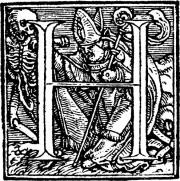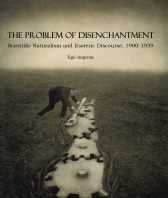It has been a while since my last post on Rupert Sheldrake’s Science Delusion, or, as it is called in the United States version (published by none other than Deepak Chopra Books – no doubt a token of proper peer-reviewed science), Science Set Free. For new readers as well as for old ones who need to refresh their memories, previous installations in the series are found here, here, and here. Without further ado, let me get started on an evaluation of the fourth dogma ascribed to science: “The laws of nature are fixed”. As in previous posts, evaluating this dogma (and whether it is one to begin with) will occasion a few short excursions in the philosophy and history of science. But this time we are also led, finally, to confront Sheldrake’s own key thesis, namely his theory of “morphic resonance”. Read on if you’re still curious.
Scientific delusions, or delusions about science? (Part four: on natural laws and resonating habits)
Scientific delusions, or delusions about science? (part two: Mechanism, life, and consciousness)
In the previous post on Rupert Sheldrake’s Science Delusion, I noted that the overall argument is based on a number of misrepresentations and stereotypes of what “science” is up to. The reader gets the impression of a monolithic structure, big-S-“Science”, now dominated by Ten Dogmas, like commandments cut in stone tablets. The history of science has, of course, been rather more complicated. Several of the dogmas do not even correspond well with the actual theories that are pursued today: at best they represent a pointed caricature, at worst, they build on stereotypes crafted about a century or longer ago, that hardly have any relevance for contemporary scientific practice. Even to the extent that some of the “dogmas” refer to presently widespread theoretical or methodological conventions, holding these to be fixed dogmas obscures the fact that they are the outcome of long and sometimes complicated historical developments, both internal and external to science. In short: that x is a widely held belief does not make x a “dogma”; that y is a commonly recommended way of pursuing a task does not make y a dogmatic procedure.
As promised in the previous post, I will go through the ten dogmas one by one to demonstrate some of these points. In the present one we shall focus on the first two, which have to do with questions about mechanism, vitalism, scientific method, materialism, and the problems of defining “consciousness”. We will visit some historical backgrounds and parallels to Sheldrake’s criticism of science, and test his claim that science has closed certain questions “dogmatically”, by holding them up against the actual historical developments of some of the special sciences. Without further ado, here goes dogma #1:
Parapsychology in Germany – review of Heather Wolffram’s Stepchildren of Science (2009)
 In 2009 a fat and promising book landed on my desk, fresh from the publisher. I had looked forward to it for a while, as the topic was highly relevant for my dissertation, and this was the first full-length academic study ever to look at it. It was furthermore written by an author whose articles on the same topic I had been following for a while, with great interest. The book was Heather Wolffram’s Stepchildren of Science: Psychical Research and Parapsychology in Germany, c. 1870-1939. I was going to write a book review for Aries, which I did. It only appeared this spring, however. Since it is already three years ago that the book was published, I think it is about time to share the review with a broader community. So please find the pre-publication version of the review below.
In 2009 a fat and promising book landed on my desk, fresh from the publisher. I had looked forward to it for a while, as the topic was highly relevant for my dissertation, and this was the first full-length academic study ever to look at it. It was furthermore written by an author whose articles on the same topic I had been following for a while, with great interest. The book was Heather Wolffram’s Stepchildren of Science: Psychical Research and Parapsychology in Germany, c. 1870-1939. I was going to write a book review for Aries, which I did. It only appeared this spring, however. Since it is already three years ago that the book was published, I think it is about time to share the review with a broader community. So please find the pre-publication version of the review below.
Religion and Scientific Change: The Case of the New Natural Theologies between the World Wars (2/2)

Today, July 4 2012, Cern announced the likely detection of the elusive Higgs boson – known by the popular press as the “God particle”.
Last installment of my lecture on “Religion and Scientific Change” closed by introducing three levels on which claims about relationships between religion and science should be analysed: the institutional, the socio-cultural, and the individual. I was going to wait a couple of days with releasing the rest, but since news headlines today have been all about the discovery of the “God particle” in the bowels of the Large Hydron Collider at Cern, it seemed highly appropriate to continue. Why is it that such a (truth be told, rather ridiculous) religious pet-name has been put on the elusive boson? Read on, and you might find out. (And: happy Higgs boson day!)
Naturalistic Spiritualisms
 Spiritualism was a symptomatic cultural trend of the Victorian period. For decades mediums captivated the worker, the bourgeois, the nobleman, the socialist utopian, the Christian apostate, and people from virtually any and all professions, with their table rappings, levitating furniture, full-form materializations, and messages from beyond the grave. When a message was coming through, whether from the ghost of Benjamin Franklin, the archangel Gabriel, or the sitter’s aunt Nelly, the spirit medium provided the goods. But despite this caricature, which no doubt does full justice to much of the movement, spiritualism also became a heated battleground for deeply natural-philosophic questions: what is Nature, how does she operate, and what can we know about her? Where are the boundaries of the natural to be drawn?
Spiritualism was a symptomatic cultural trend of the Victorian period. For decades mediums captivated the worker, the bourgeois, the nobleman, the socialist utopian, the Christian apostate, and people from virtually any and all professions, with their table rappings, levitating furniture, full-form materializations, and messages from beyond the grave. When a message was coming through, whether from the ghost of Benjamin Franklin, the archangel Gabriel, or the sitter’s aunt Nelly, the spirit medium provided the goods. But despite this caricature, which no doubt does full justice to much of the movement, spiritualism also became a heated battleground for deeply natural-philosophic questions: what is Nature, how does she operate, and what can we know about her? Where are the boundaries of the natural to be drawn?








